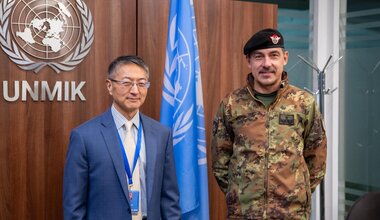26 Nov
2014
UNMIK deputy chief urges women to show courage, resolve, creativity
UNMIK deputy chief urges women to show courage, resolve, creativity
| From left to right: Laila Omar Gad, Head of UNICEF in Kosovo; Andrew Russell, UN Development Coordinator for Kosovo; Jennifer Brush, Deputy Special Representative of the Secretary-General in Kosovo; and Flora Macula, Head of UN Women in Kosovo. |
|---|
Pristina, 26 November 2014 - The Deputy Special Representative of the Secretary-General (DSRSG) in Kosovo, Jennifer Brush, today told women civil society representatives: “I urge you to demonstrate courage, resolve and creativity, in tending to the needs of your society, so that you can show a way forward to greater prosperity, democracy and stability. Do not take for granted that you deserve a place at the negotiating table in order to ensure gender equality. You need to earn that seat.”
DSRSG Brush was addressing the Open Day on Women, Peace and Security in Kosovo. She was joined by the UN Development Coordinator in Kosovo, Andrew Russell, and the Head of the UN Women Office in Kosovo, Flora Macula. The UN organized the event to foster dialogue between senior UN officials and civil society representatives, to review achievements, challenges and recommendations related to the implementation of UN Security Council resolution 1325. That landmark document, adopted in 2000, was the first UN Security Council resolution to link women’s experiences of conflict to the maintenance of international peace and security.
Participants discussed the role of women in various sectors of Kosovo society, as well as ways to protect women and prevent violence and human rights violations against them. According to civil society representatives, there had been key achievements in Kosovo since the adoption of resolution 1325. For example, the Kosovo authorities had adopted an action plan in January 2014 on the resolution’s implementation. Also, in March 2014, a law had been amended, thus acknowledging survivors of sexual violence during the conflict as a separate category, and giving them access to pensions and some health services. In addition, women’s political representation had improved due to Kosovo’s quota system.
At the same time, participants stressed that Kosovo’s policies needed to be fully implemented and supported by adequate funding. Civil society representatives cited traditional patriarchal attitudes and rigid gender roles as factors that hindered women’s abilities to fully exercise their rights under Kosovo’s legal framework. In addition, real change required economic empowerment. Finally, gender-based violence and women’s access to justice could be better addressed through increased cooperation between the police, judicary, lawyers and health institutions, participants stated.
DSRSG Brush also highlighted the important role of men in promoting women’s empowerment, saying: “Many of our male colleagues…have equally demonstrated their commitment to female inclusion and gender equality; we need to recognize and support their efforts.”
The issues discussed and recommendations made at today’s event will contribute to a global study on the implementation of UN Security Council resolution 1325, which was commissioned by the UN Secretary-General. Findings will also be widely disseminated across Kosovo, including to government representatives. Today’s attendees included the Chair of the Kosovo Assembly Commission on Human Rights and Gender Equality, and representatives from the: Agency for Gender Equality in the Office of the Prime Minister of Kosovo; Ombudsperson Institution in Kosovo;Kosovo Police; University of Pristina; Swedish Embassy; Norwegian Embassy; Finnish Embassy;Council of Europe; Kosovo Force (KFOR); Organization for Security and Co-operation in Europe (OSCE); European Union Rule of Law Mission in Kosovo (EULEX); Deutsche Gesellschaft für Internationale Zusammenarbeit (GIZ); and United States Agency for International Development (USAID).
 UN
UN United Nations Peacekeeping
United Nations Peacekeeping





